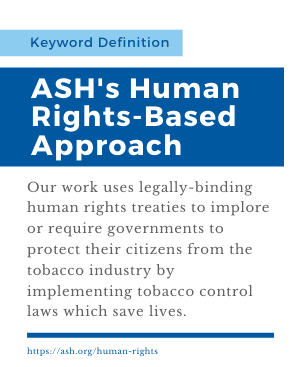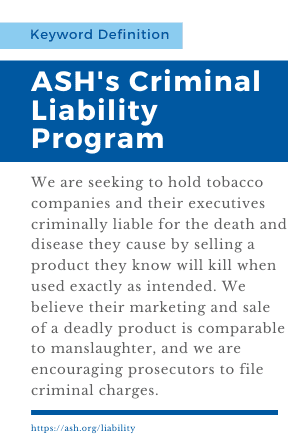ASH has a three-pronged approach to end the tobacco epidemic. Each program can end the tobacco epidemic on its own, and combined, our programs will chip away at the tobacco industry from every angle to speed up the end of tobacco-related deaths.
We’ve broken down our success in each program, and you can always learn more about our work on our main program page here. This list is not exhaustive, but it contains the major highlights from our work in 2019.
Human Rights
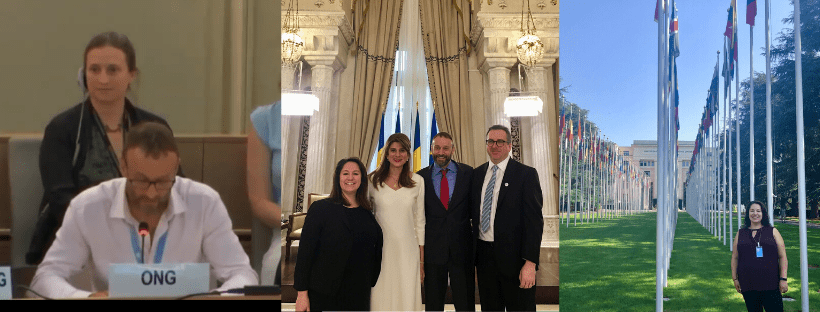
- The President of Romania graciously hosted ASH’s Global Forum on Human Rights and a Tobacco-Free World in his Presidential Palace in Bucharest, Romania on March 26, 2019. A more detailed overview and photos of the event can be found here.
- The event was also co-hosted by ASH, the European Network on Smoking Prevention (ENSP), and the 2035 Tobacco-Free Romania Initiative.
- Global leaders in health and human rights attended, including speakers Vytenis Andriukaitis (EU Commissioner for Health and Food Safety), HRH Princess Dina Mired of Jordan (President-Elect of the Union for International Cancer Control), and Dr. Vera Luiza Da Costa e Silva (Head of the Framework Convention on Tobacco Control Secretariat).
- This event was crucial for our human rights program because it solidified ASH’s role as the experts and convener for this subject area that is new to tobacco. We showcased the legitimacy of our program and the exciting new developments that will help end the tobacco epidemic (i.e. reporter to human rights bodies, as discussed below).
- Following our Forum, we participated in ENSP’s European tobacco control conference and successfully advocated for the conference to adopt the Bucharest Declaration on Human Rights and a Tobacco Free Europe.
- ASH worked with the Georgetown University Law Center to draft an in-depth legal memo on a human rights-based approach to tobacco control which further strengthens our work and helps us recruit new academic supporters.
- The ASH Tobacco and Human Rights Hub was launched in March 2019 and lauded by the public health community who found it to be an invaluable resource and easy to use.
- 6 Capacity Building and Training Workshops:
- ASH organized and facilitated a human rights capacity building training in Bucharest, Romania during the ENSP conference in March 2019 that trained 30 European advocates on how to use a human rights-based approach to reduce tobacco use.
- ASH developed and co-hosted a capacity building training in Spanish for advocates in Madrid, Spain in May 2019. The workshop was attended by public health advocates, human rights experts, government officials, and some media. As a result of this workshop, tobacco centric reports were developed and submitted to human rights treaty bodies.
- ASH prepared a partner organization from the Middle East to present our training at the WHO FCTC Eastern Mediterranean meeting held in Kuwait in early May 2019.
- ASH’s Executive Director was invited to present our human rights-based approach during the plenary of the Global Tobacco Free Summit in Tokyo, Japan in October 2019. Following the momentum built at the plenary session, ASH led a workshop to train local advocates on how to use human rights tools in their tobacco control work. Read his blog on that work here.
- ASH prepared a presentation on using a human rights-based approach to advance the implementation of the WHO Framework Convention on Tobacco Control (FCTC) at the conference of the Union Against Tuberculosis and Lung Diseases held in Hyderabad, India in November 2019.
- ASH presented our human rights-based approach to treat and prevent non-communicable diseases (NCDs) at a plenary in Panama for a Panamanian Government conference in December 2019 called the POR UNA VIDA SALUDABLE: Taller Latinoamericano de ENT.
- Reports from Individual Countries – asking countries to include tobacco when reporting back to human rights bodies
- Israel: ASH submitted a human rights report in collaboration with local national NGOs in Israel.
- Colombia: ASH submitted a human rights report in collaboration with local national NGOs in Colombia.
- Spain: Following ASH’s workshop in Madrid, the Spanish coalition who attended began working on a submission to the Convention on the Elimination of all Forms of Discrimination Against Women (CEDAW) with ASH’s assistance and plans to submit it soon.
- ASH also worked with our colleagues in Spain to submit a report to the Human Rights Council in advance of the Spanish government’s Universal Periodic Review, which increases the likelihood that the Spanish government will be asked to formally report on their work to protect their citizens from the tobacco industry. ASH will continue supporting our partners through Spain’s UPR public review next January.
- Our Spanish colleagues produced a video featuring ASH at the workshop, to continue to educate more partners on tobacco and human rights. Watch the video here, only available in Spanish.
- United States: ASH wrote and submitted a report on the state of tobacco control in the United States for the US’s upcoming Universal Periodic Review (UPR) to the Human Rights Council with 14 partner organizations as co-signers.
- Japan: Following ASH’s workshop in Japan, we are supporting colleagues in their development of Japanese reports that will be submitted to UN Human Rights bodies in 2020.
- Reports to United Nations bodies (i.e. sub groups for different issue areas)
- ASH submitted a letter highlighting the link between tobacco control, implementation of the WHO tobacco treaty, and the UN Sustainable Development Goals (SDGs) to the Office of the High Commissioner for Human Rights (OHCHR). ASH promoted tobacco control as an example of “effective methods to foster cooperation between local government and local stakeholders for the effective promotion and protection of human rights.”
- ASH submitted a written statement to the United Nations Human Rights Council (HRC), with 20 additional organizations signing on, supporting the link between tobacco and human rights.
- ASH responded to a call for submissions from the UN Working Group on Business and Human Rights, linking tobacco as a human rights issue.
- ASH responded to calls for input on children’s rights and the environment with a submission that described tobacco’s negative influence on both topic areas.
- ASH partnered with the African American Tobacco Control Leadership Council to answer a call for input from the Anti-Racial Discrimination Section of the Office of the High Commissioner for Human Rights. Our response focused on menthol cigarettes and targeted advertising in the U.S.
- ASH is working with colleagues in Ireland, Japan, France and more to develop tobacco centric reports to human rights treaty bodies in 2021.
- ASH advocacy at major human rights meetings
- ASH staff were asked to present at the Committee on the Status of Women in March at the UN in New York to highlight the negative impact tobacco has on women’s rights.
- ASH staff attended the 41st Regular Session of the Human Rights Council in June 2019 in Geneva, Switzerland. They met with the High Commissioner on Human Right’s office on how to best include tobacco control in the global human rights agenda. ASH submitted a written statement in advance of the session and ASH Executive Director Laurent Huber read an oral statement which solidified that ASH’s tobacco standpoint would be included in the official record of the UN Human Rights Council. The Palau delegation also read an oral statement in support of our work, which states that implementing the FCTC, the existing work of the UN Human Rights Council and the 2030 Sustainable Development Agenda are all mutually reinforcing.
- ASH hosted a side meeting while in Geneva, Switzerland in June where a representative from the WHO tobacco treaty (FCTC) Secretariat presented.
- ASH made a statement at the 42nd Session of the UN Human Rights Council (HRC). Watch the video here. These statements promote and strengthen our work by including tobacco in formal human rights agendas.
- ASH presented at the First Feminist and Women’s Movement Action Plan in November and will serve on their editorial committee. This will ensure that tobacco is addressed in parallel reports submitted by NGOs who submit parallel reports to women’s rights treaties.
- ASH provided input on the NGO guidelines for the 25th anniversary of the 4th World conference on Women, ensuring the tobacco industry could not infiltrate the conference. ASH provided input on the Beijing Declaration and Platform For Action (1995) developed by the NGO Committee on the Status of Women, ensuring that a question was included to ask countries about their implementation of the tobacco treaty (FCTC).
- Preparation for the 9th negotiations (COP9) of the World Health Organization (WHO) tobacco treaty (the Framework Convention on Tobacco Control, FCTC)
- ASH staff met with the head of the FCTC Secretariat to begin planning and discuss next steps to advance a tobacco and human rights decision at COP9 in 2020.
- As a result, the WHO FCTC Secretariat began working with the UN Human Rights Council (HRC) to strengthen the global understanding that their work is mutually reinforcing.
- This active partnership is in part a result of ASH’s advocacy at COP8 in 2018, which led to the final COP8 report mentioning the FCTC Secretariat needing to work with the UN HRC and to the FCTC Secretariat being invited to attend and present at a tobacco session during the 41st session of the HRC hosted by ASH.
- ASH continues to Chair the Framework Convention Alliance (FCA) Human Rights Task Force and has led a strategy to promote the adoption of a human rights Decision by COP9 in 2020, which would ensure that parties to the FCTC utilize human rights language, measures, and motivations in their tobacco control efforts.
- ASH staff met with the head of the FCTC Secretariat to begin planning and discuss next steps to advance a tobacco and human rights decision at COP9 in 2020.
Project Sunset
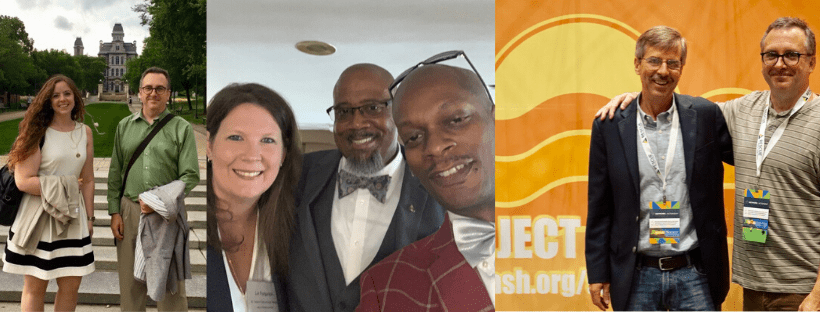
- Research and Coordination
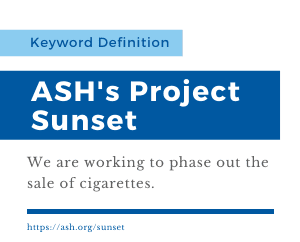
Read more here - In January, ASH Staff met with Syracuse University students who worked on developing communications tools for our Project Sunset throughout the Spring semester and presented their final recommendations to ASH staff in May.
- In February, ASH hosted a planning meeting for our global colleagues interested in working to phase out the sale of cigarettes in their countries, ensuring we share best practices around the world.
- Colleagues from the global steering committee then presented on Project Sunset at the Oceania Conference of the Society for Research on Nicotine and Tobacco in October.
- In April, we began developing the branding for this campaign when the name was finalized as Project Sunset. Our Project Sunset turns Philip Morris USA’s own Project Sunrise, initiated in 1995, around on its head. Project Sunrise was a scheme to renormalize smoking; we will instead phase out the sale of cigarettes.
- ASH continued working with our National Steering Committee to support Project Sunset which was formally launched at the National Conference on Tobacco or Health (NCTOH) in August in Minneapolis. Read about the launch in the British Medical Journal blog here.
- Steering Committee Members spoke on a sub-plenary panel on how and why we need to phase out the sale of cigarettes. They also gave expert talks at ASH’s booth.
- Mayor John Mirisch accepted ASH’s Project Sunset Award for Courage in Public Health to the City of Beverly Hills, CA following their leadership in ending the sale of tobacco products.
- ASH met with several research institutes to look for ways to collaborate on research surrounding the end of the sale of cigarettes.
- ASH was quoted in several news outlets discussing this work: Los Angeles Times, Fox News Podcast, San Francisco Chronicle, and a supporter wrote this Chicago Tribune opinion piece in support of our work.
- ASH co-chairs a global coordinating committee to share resources and build support across countries to help phase out the commercial sale of tobacco products.
- Local U.S. Action: ASH monitors and supports initiatives led by local advocates, like the instances below.
- Beverly Hills, CA – the 1st U.S. city to phase out the sale of all tobacco products. Here’s how they did it.
- In February, ASH staff testified at a City Council meeting in Beverly Hills, CA during their initial discussions of their plan to ban the sale of tobacco products in their city. A recap of that session can be found here.
- In early April, the Beverly Hills Health and Safety Commission held its final public forum on banning tobacco sales.
- On May 7th, they reported to the City Council with recommendations.
- Beverly Hills, CA – the 1st U.S. city to phase out the sale of all tobacco products. Here’s how they did it.
- With Mayor John Mirisch as a strong supporter, on June 4th, the Beverly Hills City Council unanimously approved a ban on the sale of all tobacco products. Read ASH’s Press Release Here. Read the Los Angeles Times’ coverage here.
- The law went into effect July 4, 2019 with the phase-out period beginning.
- As of January 1, 2021, no further sales will be allowed. The law applies to all tobacco products, including e-cigarettes and heat-not-burn products. There are two exemptions: the three cigar bars in the city can continue to sell cigars to members only and only on the premises, and second, hotels will be able to sell tobacco to hotel guests but only through concierge service.
- Myrtle Beach, SC passed an ordinance to ban the sale of tobacco products within their tourist district.
- A bill was introduced in the Hawaii legislature to phase out the sale of cigarettes by 2024. The bill was defeated in committee. Read ASH’s statement here.
- In June, Manhattan Beach, CA City Council voted to have their health commission explore the possibility of banning tobacco sales. Discussions continued at additional sessions throughout the year, ending with City Council asking their health and safety commission to draft an ordinance to phase out the sale of all tobacco products.
- Hermosa Beach, CA City Council voted to instruct their staff to develop a plan to phase out tobacco sales during a November session.
Criminal Liability
- Our Dutch colleagues had been waiting on a decision from the Dutch court regarding their attempted murder case that was heavily supported by Dutch citizens. Unfortunately, in January, the Court returned a decision saying that it was an issue for the Dutch Parliament to decide rather than the courts. This was a powerful learning experience for everyone involved, particularly given that the Court did not reject the case and simply stated it was not in their jurisdiction to decide. Our partners are refining their case and will continue to pursue it.
- ASH continues to work on several other criminal cases around the world, none of which are public yet to protect us all from tobacco industry interference and infiltration.
Global Best Practices
- In February, ASH provided a video testimonial to the Pan American Health Organization (PAHO) as part of our status as a Non-State Actor (NSA) in official relations. The interview consisted of a Q&A on ASH’s history with PAHO and the value of our official relationship.
- In April, ASH was invited to participate in an event organized by the Summits of the Americas Secretariat of the Organization of American States (OAS). ASH and Corporate Accountability International (CAI) presented the role that the tobacco industry has played in blocking the implementation of the WHO tobacco treaty (FCTC) in countries in the Americas.
- ASH was quoted in this Swiss news story about an outgoing United Nations (UN) official writing a letter to the UN Secretary-General, recommending that their position on excluding the tobacco industry be re-examined. ASH issued an immediate joint letter response with the Framework Convention Alliance, Campaign for Tobacco-Free Kids, and the STOP Partners (alliance of the University of Bath, Global Centre for Good Governance in Tobacco Control, SEATCA, The Union, and Vital Strategies funded by Bloomberg),calling on Secretary-General Guterres to reject the consideration.
- ASH joined the sign on letter calling for the International Labor Organization to reject tobacco funding. Read the letter here. When the decision came in our favor, we released this statement.
- In October, ASH released a new report on tobacco industry interference in U.S. public policymaking. We used the scoring system applied by a global report on tobacco industry interference that was released the same day and included our U.S. data, ranking the U.S. worse than many other countries when it comes to allowing tobacco industry interference in public health policies. Read our press release and the reports here.
Communications
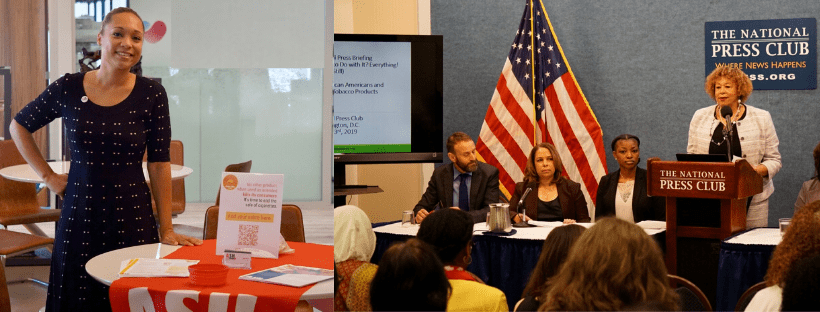
- Website Highlights
- ASH publishes regular blogs, such as this one on why we should phase out the sale of cigarettes and another noting there is no legal right to smoke.
- ASH’s 2018 Annual Report was published here.
- Media Highlights
- ASH used Facebook Live videos as a chance to comment on recent news and how those announcements impact our work. Watch the videos here.
- ASH teamed up with the African American Tobacco Control Leadership Council (AATCLC) to organize a press conference at the National Press Club on the importance of including menthol in conversations about tobacco.
- ASH Executive staff spoke at the event. Event quotes, photos, and the press release are found here.
- The British Medical Journal’s Tobacco Control Blog published this article from ASH on Beverly Hills, CA being the first to phase out tobacco sales in the U.S.
- ASH was quoted in the New York Times discussing Juul. Read that article here.
- As a part of the DC Tobacco-Free Coalition, ASH co-hosted their DC Calls It Quits Week Facebook Live and participated in several local events to help encourage residents to quit smoking.
- During the vaping illness outbreak, we were quoted in the New York Times, Healthline, and Spectrum News TV, to name a few places.


